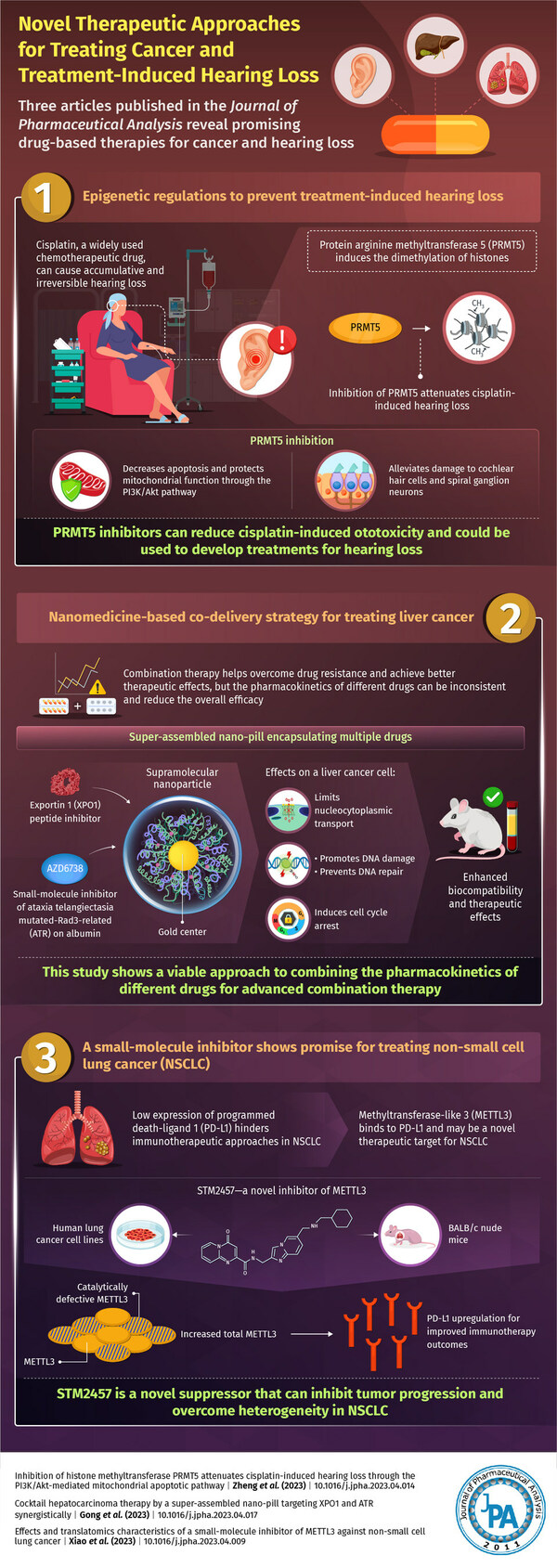New Journal of Pharmaceutical Analysis Articles Showcase Promising Therapeutic Candidates for Treating Cancer and Hearing Loss
09 Aug 2023
Researchers report innovative techniques to treat challenging cancers and manage the side-effects of therapy
XI'AN, China, Aug. 9, 2023 /PRNewswire/ -- Although cancer treatment has advanced significantly over the last decade, some fairly common cancers remain extremely difficult to treat. Besides, some chemotherapeutics or anti-cancer drugs can have serious, irreversible side-effects. The latest issue of the JPA features three articles that highlight novel treatment strategies based on cutting-edge research on cancer and chemotherapeutic drug-induced adverse events.
Continue Reading

Preview
Source: PRNewswire
Highlights of the Journal of Pharmaceutical Analysis June 2023 issue
The first study reports a new approach to prevent hearing loss induced by the widely used chemotherapeutic drug "cisplatin". The article was available online in April 2023 and published in Volume 13, Issue 6 in June 2023. The researchers focused on an inhibitor of protein arginine methyltransferase 5 (PRMT5), a histone-modifying enzyme and epigenetic regulator. In vitro and in vivo experiments revealed that inhibition of PRMT5 alleviated cisplatin-induced mitochondrial dysfunction and apoptosis, and thus ameliorated hearing loss by protecting cochlear hair cells and spiral ganglion neurons. A better understanding of the role of PRMT5 in hearing loss could help scientists develop effective hearing protection drugs and prevent this unwanted side-effect. In this regard, corresponding author Yingzi He states that "Our findings suggest that PRMT5 inhibitorsPRMT5 inhibitors have strong potential as agents against cisplatin-induced ototoxicity and can lay the foundation for further research on treatment strategies for hearing loss."
In the second study, scientists addressed the problem of inconsistent kinetics of multiple drugs given in a combination therapy. They developed a super-assembled nano-pill that can encapsulate and deliver two different drugs to liver cancer cells. They engineered a supramolecular assembly combining an exportin 1 (XPO1)-inhibiting peptide and a small-molecule inhibitor of ataxia telangiectasia mutated-Rad3-related (ATR). These compounds act synergistically in liver tumors by promoting DNA damage, preventing DNA repair, and arresting the cell cycle. The nano-pills were highly biocompatible with a remarkable therapeutic effect. "This work not only provides a co-delivery strategy for intensive liver cancer treatment with potential for clinical translation, but also extends the scope of drugs for developing advanced combination therapies," highlights the corresponding author Suxia Han.
Finally, the third article by Han Xiao et al. presents a comprehensive analysis of the compound STM2457, the novel small-molecule inhibitor of methyltransferase-like 3 (METTL3), which has been reported to promote the disease progression in non-small-cell lung cancer (NSCLC). The authors used a combination of experimental and bioinformatic data to show that STM2457 could significantly inhibit pulmonary colonization and halt NSCLC progression. "The idea of targeting METTL3 is like a "black swan", and its silhouette across the sky was first captured by leukemia and pharmaceutical experts, who synthesized STM2457, the first bioavailable small-molecule inhibitor of METTL3. The cheer of the "black swan" discovery inspired our follow-up work. In the future, targeting the components of translation machinery will become a new therapeutic strategy for NSCLC," states the corresponding author Han Xiao.
Reference
Authors: Zhiwei Zheng1, Benyu Nan2, Chang Liu3, Dongmei Tang1, Wen Li1, Liping Zhao1, Guohui Nie4, and Yingzi He1
Title of original paper: Inhibition of histone methyltransferase PRMT5 attenuates cisplatin-induced hearing loss through the PI3K/Akt-mediated mitochondrial apoptotic pathway
Journal: Journal of Pharmaceutical Analysis
DOI: https://doi.org/10.1016/j.jpha.2023.04.014
Contact:
Mengjie Wang
+86-(0)29-82657423
[email protected].com
SOURCE Journal of Pharmaceutical Analysis
For more details,please visit the original website
The content of the article does not represent any opinions of Synapse and its affiliated companies. If there is any copyright infringement or error, please contact us, and we will deal with it within 24 hours.
Organizations
-Indications
Chat with Hiro
Hot reports
Get started for free today!
Accelerate Strategic R&D decision making with Synapse, PatSnap’s AI-powered Connected Innovation Intelligence Platform Built for Life Sciences Professionals.
Start your data trial now!
Synapse data is also accessible to external entities via APIs or data packages. Empower better decisions with the latest in pharmaceutical intelligence.


